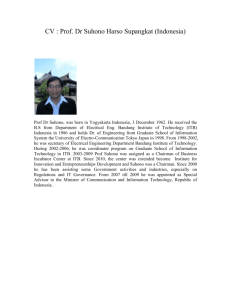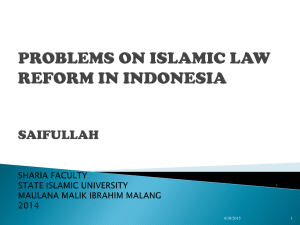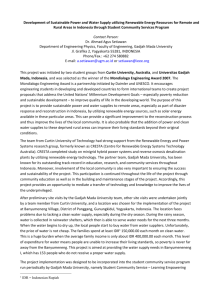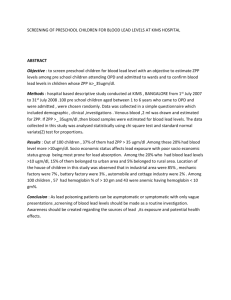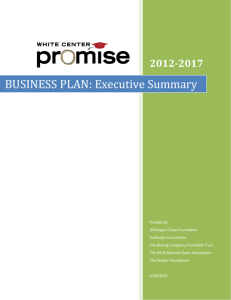wTO Chairs program indonesia
advertisement
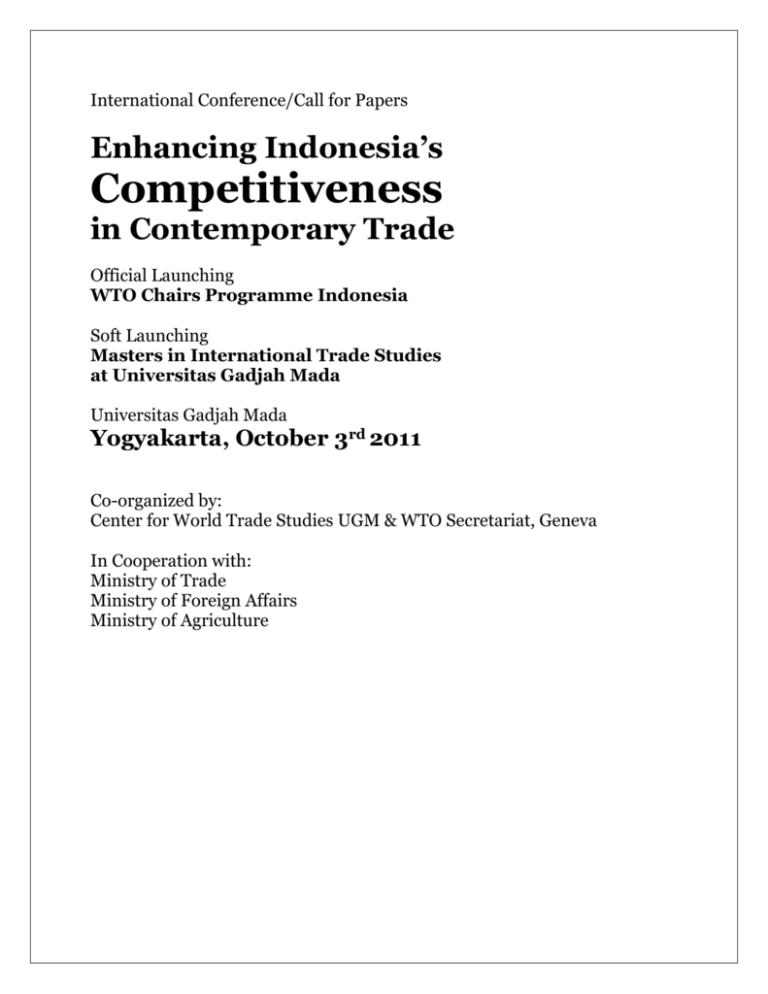
International Conference/Call for Papers Enhancing Indonesia’s Competitiveness in Contemporary Trade Official Launching WTO Chairs Programme Indonesia Soft Launching Masters in International Trade Studies at Universitas Gadjah Mada Universitas Gadjah Mada Yogyakarta, October 3rd 2011 Co-organized by: Center for World Trade Studies UGM & WTO Secretariat, Geneva In Cooperation with: Ministry of Trade Ministry of Foreign Affairs Ministry of Agriculture Terms of Reference Competitiveness plays a crucial role contributing a country’s success in international trade. Recent publication of World Economic Forum (The Global Competitiveness Report 2010–2011) illustrates how economies of the world are struggling amidst turbulent condition of the world economy today. Performance in the so-called “12 pillars of competitiveness” –according to the report—will eventually lead to their capacity to survive and succeed in such a condition. The pillars which are categorized under 3 (three) main key factors –the basic requirements, efficiency enhancers and innovation & sophistication factors— measure how economies are performed which then reveal their position and rank vis a vis others. Indonesia’s overall position in the report is described as having a transition from the 1 st key factors (basic requirements) to the 2nd ones (efficiency enhancers). Its Global Competitiveness Index (GCI) score for the year 2010-2011 is 4.43 made it ranked 44th among 139 economies surveyed. The position is an increase of the last year’s ones (2009-2010) which was ranked 54th. The report describes Indonesia’s impressive gain in areas mainly driven by a healthier macroeconomic environment and improved education indicators: macroeconomic environment, public debt management, savings, inflation, and other education-related indicators. As the report suggested, Indonesia maintains a relatively healthy macroeconomic environment (35th, up 17) throughout the crisis. Whereas most other economies faced their budget deficits surge, Indonesia kept its deficit under control. Public debt remains low at 31 percent of GDP, and savings rose to 33 percent of GDP. In addition, inflation in 2009 slowed down to 4.8 percent, half the rate of 2008. Moreover, Indonesia has improved across all education-related indicators included in the GCI (The Global Competitiveness Report 2010-2011: 29). However, the report suggests that substantial improvement in those areas as well as others is needed. Particular concern is on the quality of infrastructure (82nd), specifically ports (96th), roads (84th), and the electricity supply (97th). Additionally, the report also highlights several indicators which create worrisome health situation: tuberculosis and malaria incidence, as well as infant mortality rates, remain among the highest in the world. Other area of concern relates to technological readiness (91st). Despite rapid uptake in recent years, the report indicates that Information and Communication Technology use still remains low in international comparison (103rd). With such a performance and despite its major accomplishment in macro-economic stability, Indonesia’s efforts in achieving better position in its overall competitiveness index have to cope with numerous challenges. They are focused more on addressing factual issues in bureaucratic efficiency, efficacy in budget management, assurance for enforced regulations, coherence in policy-making processes and its technical implementation, facilitative roles of government, and finally sound diplomatic-trade relations which will eventually lead to enhanced performance in Indonesia’s industrial, trade and business sectors. 2 With the purpose of transmitting those factual issues in the nation’s competitiveness effort towards investigating features, aspects and factors underlying them, the conference suggests the following clusters to be addressed further: business-economic dynamics, political-economic dimension, legal and technical-aspects. It assumes that the four are affecting competitiveness in the areas of trade, industry and other business sectors. The clusters are therefore designed to mapping out and enumerating problems (and solutions) dealt with and by relevant players in competitiveness endeavor. The first cluster –business-economic dynamics— observes practices of business and economic policy-related issues and context of competitiveness both at domestic and international levels. At the domestic level, competitiveness challenges stem from a wide array of arenas, ranging from corporate innovative strategy to government regulation and other public sectors-related policy affecting business activities. The dynamic nature of business and government relations instigates further a country’s competitiveness characters which –as suggested by the report— eventually affect its trade accomplishment. At the international level, existence of regimes on trade (as in the case of multilateral arrangement of WTO, regional arrangement and bilateral free trade agreements), investment, monetary and finance, and other international business and economic practices as well as norms provide distinct landscape in competitiveness endeavor. The second cluster –political economic dimension- focuses on issues on how a player’s position affects its negotiating capacity as well as bargaining power in trade relations. At international arena, the issue has a conjunction with progressing trade regimentation under WTO and other international, regional and sub-regional arrangement schemes. Domestically, the issues cover a broad area of comprehension, i.e. to include questions on bureaucratic harmonization among various governmental agencies prepared for trade negotiation; issues on domestic, national or local capacity building in the face of global commodity and value chains practices; challenges resulted from tensions among business, governmental and societal interests in trade; concerns on increasing roles of multi-track diplomacy as instruments in gaining trade; and issues of social activism as part of trade policy formulation. The third cluster on legal aspects in trade addresses needs to comprehend and capacitate legal understanding and expertise in international trade, especially as mandated in the WTO scheme. It covers mainly comprehension on the WTO Dispute Settlement Mechanisms, agreement and practices on TRIPs (Trade-Related Intellectual Property Rights), and how member countries of WTO deal with such a mechanism and agreement. The cluster puts particular concern on how developing countries (such as Indonesia) prepare themselves in dealing with the complexities, difficulties, challenges, obstacles as well as opportunities, chances and prospects of such a multilateral legal regime. It finally touches the issue of how domestic and national regulations and practices of trade are in parallel (or comply) with the mechanism and agreement. 3 The last cluster on technical aspect of trade gives attention to more technical and practical dimensions in trade relations. Trade practices in product standardization and sanitary-phyto-sanitary (SPS) are among the most salient ones, especially in agricultural commodity sector and exported products which needs quality control mechanisms. Additionally, regulations, rules and practices in Trade Defense Mechanism (TDM) under WTO would also need particular attention as to comprehend how technicalities in its measures and procedures could become challenges for any international trade players. Roles of relevant governmental agencies as well as research, development and demonstration (RD&D) institutions, universities, and other community-based initiatives in technological advancement and innovation are needed to be observed closely in order to set off an all-inclusive approach to technical aspects of trade. WTO Chairs Programme (WCP) The WCP is a newly-installed program of WTO Secretariat –starting in 2010— aiming at enhancing roles and participations of academic institutions in developing countries in trade-related issues. In the WTO Director General Pascal Lamy’s words, the endeavor is part of the WTO and its university partners’ commitment in reaching out leaders of tomorrow, helping them to better understand the complex mechanism of the global trading system. By enhancing trade policy skills of these young people, the WCP helps foster the capacity of developing countries to participate fully in the global trading system. Through a proposal prepared and proposed by the Center for World Trade Studies in the mid of 2009, UGM is selected (along with other 14 universities) as WCP partners. The selection is conducted as more than 70 proposals were submitted. WCP UGM/Indonesia –which is planned and implemented for a 4 (four) year period (2010-2013)— brings up the following theme: Capacity Building for the Development of MultiDisciplinary Study and Research on WTO and other International Traderelated Issues in Indonesia and/or Southeast Asia. Various programs and activities in capacity building are planned and implemented in line with WCP UGM/Indonesia objectives, i.e. to comprehend the 3 (three) key issues in trade (trade dynamics, WTO and competitiveness. Capacity building program/activities in research are focused on developing trade database, publication and policy research clusters. Academic capacity building program/activities are centered on developing and initiating a Multi-disciplinary Masters Program in International Trade, the so-called Masters in International Trade Studies (MITS). While program/activities in outreach are aimed at institutionalizing short courses and training in trade-related issues and a trade forum designed and dedicated specifically to trade studies and interests. WCP UGM/Indonesia is administered by the Center for World Trade Studies which is under supervision of UGM’s Institute for Research and Community Services. 4 Program and Agenda The program of the conference, official launching of WCP Indonesia and soft launching of MITS UGM shall comprise the following topics and speakers: 1. Keynote Topic: “Indonesia’s Competitiveness: Current Issues and Future Challenges” Keynote Speaker: H.E. Ms. Marie E. Pangestu [Minister of Trade, Indonesia] The topic elaborates Indonesia’s current policies and debates on competitiveness as to chart future trends and challenges faced by Indonesia’s policy-makers, business players, community leaders, academic scholars, social activists and other relevant stakeholders in developing the nation’s competitiveness. 2. Opening Topic: “World Trade and Global Competitiveness: WTO Perspective” Speaker: H.E. Mr. Harsha V. Singh [Deputy Director General, WTO] The topic elaborates dynamics in world trade relations as it affects to countries capacity in capitalizing and developing their competitiveness in trade and other international economic areas. The current trade system under WTO offers particular features which in turn help shape the way competition among nations in trade is conducted. 3. Comparative and Clustered Topics: The topic elaborates international comparative perspectives and experiences on the issues of competitiveness as they are contributive to the Indonesian ones. The clustered topics follow afterwards as to deepen competitiveness challenges faced by Indonesia’s trade sectors. a. Comparative Experiences Invited Speakers: WCP UGM/Indonesia Counterparts: Mr. Robert Teh/Mr. Gerardo T. Thielen WCP Universities Partners: Chair-holders of WCP at: 1. 2. 3. 4. 5. Shanghai Institute of Foreign Trade: Mr. Lei Zhang University of Jordan: Mr. Taleb Awad Warred University of Mauritius: Ms. Verena Tandrayen-Ragoobur National University of Singapore: Mr. Michael Ewing-Chow Vietnam National University: Mr. Vu Quoc Hu 5 b. Clustered Topics: 1. Indonesia’s Competitiveness and Its Position in Contemporary World Trade Invited Speakers: Mr. Mudrajad Kuncoro/ Mr. Anggito Abimanyu 2. Indonesia’s Political Economic Challenges in International Trade Invited Speakers: Mr. Mohtar Mas’oed/Mr. Nanang Pamuji Mugasejati 3. Indonesia’s Challenges and Opportunities in Enhancing Trade Capacity and Expertise in International Trade Invited Speakers: Mr. M. Hawin/Mr. Nandang Sutrisno 4. Technical Aspects and Issues in Indonesia’s Key Trade Commodities [Manufacture, Agriculture and Services] Invited Speakers: Mr. Masyhuri/Mr. Dwidjono Hadi Darwanto Detailed Agenda Sunday, October 2nd 2011 [19.00-21.00 WIB] Venue: Balairung UGM Welcoming Dinner Welcoming speech by Rector of UGM Introduction: DDG WTO and delegation Cultural performance Monday, October 3rd 2011 Venues: Rector’s Office, Balai Senat UGM, Prambanan Temple Conference 6 07.30-08.30 Registration of participants 08.30-09.00 Courtesy meeting at the Rector of UGM’s Office 09.00-09.15 Opening Speech by Rector of UGM, H.E. Mr. Sudjarwadi 09.15-09.45 Keynote Address by Minister of Trade, H.E. Mrs. Marie E. Pangestu 09.45-10.10 Launching Ceremony of WCP UGM/Indonesia 10.00-10.15 Coffee Break 10.15-12.00 Morning Session Opening Speaker: DDG WTO H.E. Mr. Harsha Singh Discussants: 1. Mr. Makarim Wibisono 2. Mr. Erman Rajagukguk 12.00-13.00 Lunch Break 13.00-18.00 Afternoon Session 1st Session: Comparative Perspectives [13.00-15.00] Speakers: Mr. Robert Teh/Mr. Gerardo T. Thielen Mr. Lei Zhang/Mr. Michael Ewing-Chow Mr. Taleb Awad Warred/Ms. Verena Tandrayen-Ragoobur Mr. Vu Quoc Hu Coffee Break [15.00-15.30] 2nd Session: Clustered Topics [15.30-17.30] Speakers: Mr. Mudrajad Kuncoro/Mr. Anggito Abimanyu Mr. Mohtar Mas’oed/Mr. Nanang Pamuji Mugasejati Mr. M. Hawin/Mr. Nandang Sutrisno Mr. Masyhuri/Mr. Dwidjono H. Darwanto 17.30-18.o0 Wrap-Ups and Closings Farewell Dinner 20.00-22.00 Dinner at Prambanan Temple Ramayana Ballet Performance 7 REGISTRATION FORM Please print, scan, and return by e-mail. Please note that this is how you will be indicated on your badge and the list of participants. International Conference on “Enhancing Indonesia’s Competitiveness in Contemporary Trade” Date : October 3, 2011 Place : Balai Senat, Central Building, North Wing, Universitas Gadjah Mada, Indonesia 1. Presenter/Attendance’s Information Family Name : ________________________________________________ First Name : ________________________________________________ Title : Prof. Dr. Mr. Ms. Other:______________________ Organization : ________________________________________________ Address : ________________________________________________ Postal Code : ________________________________________________ City : ________________________________________________ Country : ________________________________________________ Telephone : ________________________________________________ Fax : ________________________________________________ E-mail : ________________________________________________ Attend the welcoming and farewell dinner: Yes/No (please circle the appropriate) I would like to register as: Presenter/Speaker/Attendance (please circle the appropriate) 2. Conference Fee Conference fee includes admission to conference sessions, proceedings, registration materials, and certificates. a. Presenter (Call for Papers) Domestic : IDR 300.000,International : US $ 75 b. Attendance Early bird payment (before August 31, 2011) - Undergraduate students IDR 150.000,- Postgraduate students/Public IDR 200.000,Payment after August 31, 2011 - Undergraduate students IDR 250.000,- Postgraduate students/Public IDR 300.000,- 8 Participants who want to attend welcoming dinner and farewell dinner should pay additional cost US $ 25. 3. Payment Total amount :_________________ I will pay the amount by bank. Payment information Bank : Bank Mandiri Cabang MSi UGM Account Holder : Prof. Dr. Ir. Masyhuri – PSPD Account Number : 137-00078-9389-0 Swift Code : BMRIIDJA Please state ‘CWTS International Conference: Enhancing Indonesia’s Competitiveness in International Trade’ and the full name of speaker/attendance on the bank transfer. 4. Facilities a. Batik bag b. Conference materials c. Coffee break d. Lunch e. Certificate f. Proceeding (only for the presenters) g. Welcoming dinner, farewell dinner, Ramayana Ballet, and Prambanan Temple (optional) 5. Additional Instructions Deadlines: For presenters, an email message confirming receipt of payment must be sent to the email address provided below no later than September 26, 2011 (the deadline for final paper submission). Please use one form per person. If you have problems in registration process, please contact the conference office at cwts.ugm@gmail.com or the address below. Payment information: For attendance, registration form must be accompanied by full payment in order to be processed. No registrations will be accepted by telephone. Refund Policy: Due to limited seats available, every registration fee is not refundable. By sending this registration form I acknowledge that I commit myself to the immediate payment of the full conference fee. I have taken notice of the cancellation terms on this form. 9 Date : _____/________/2011 Signature: _______________________ For further information, please contact: CWTS International Conference: Enhancing Indonesia’s Competitiveness in International Trade Centre for World Trade Studies UGM Gedung Unit Perpustakaan Terpadu III, Lantai 3, Universitas Gadjah Mada Jl. Tridharma, Bulaksumur, Yogyakarta 55281, Indonesia Phone/Fax: +62 274 580273 E-mail: cwts.ugm@gmail.com or cwts@ugm.ac.idGadjah Mada Jl. Tridharma, Bulaksumur, Yogyakarta 55281, Indonesia Phone/Fax: +62 274 580273 E-mail: cwts@ugm.ac.id, cwts.ugm@gmail.com 10 CALL FOR PAPERS Guidelines The Launching of WCP and International Conference on World Trade Studies will take place in Yogyakarta, Indonesia on October 3, 2011, with the overarching theme “Enhancing Indonesia’s Competitiveness in Contemporary Trade.” The conference will be hosted by the Center for World Trade Studies – Universitas Gadjah Mada, Indonesia. The information and materials on the programme, accommodation, and travel required during your attendance on the conference will be available on the conference website at www.cwts.ugm.ac.id. Participants have been invited for the plenary sessions will be selected on the basis of abstracts submitted in response to this Call for Papers. The working language of the Conference is English. SELECTION CRITERIA Senior and junior scholars (including PhD Candidates), practitioners, academicians, and government officers are invited to respond to this Call for Papers. Scholars from any part of the world and of any nationality are eligible to apply. All papers presented in the Launching of WCP and International Conference on World Trade Studies will be selected through a competitive process from abstracts received in response to this Call for Papers. Only one abstract per author will be considered. Abstracts should be no more than 300 words in length and must be submitted using the online submission procedure at www.cwts.ugm.ac.id The following criteria will be used to aid the selection of papers: 1. quality of the research 2. originality of the work 3. links to the conference and the aforementioned theme 4. geographical representation of the speakers Papers delivered at the conference must be unpublished, in an advanced stage of completion and ready to be included in the conference proceedings. TIMELINE 1. The deadline for the submission of abstracts is September 8, 2011; 2. Successful authors will be informed by September 10, 2011; 3. The deadline for the submission of Final Papers from accepted abstracts to be included in the conference proceedings is September 26, 2011; 4. Papers are presented at the Launching of WCP and International Conference on Enhancing Indonesia’s Competitiveness in Contemporary Trade (Oct 3 2011) 11 SUBMISSION OF ABSTRACTS 1. Abstracts must be submitted using the online submission form available at www.cwts.ugm.ac.id 2. Abstracts must be no more than 300 words in length and only one abstract per author may be submitted 3. Please note that the online submission form should be scanned and uploaded. Send via e-mail: cwts.ugm@gmail.com (Cc: cwts@ugm.ac.id). Please kindly write the subject as: ABSTRACT – WCP 4. Abstracts received after the deadline will not be considered 5. On submission of an abstract, authors should receive an email confirming receipt of their submission and the form of their application. Authors whose papers are selected for the conference will be notified by the committee no later than September 10, 2011. 6. Authors wishing to respond to this Call for Papers should have the following information ready before starting the online submission process: (a) contact and institution details, including full postal address and telephone number; (b) email address; (c) the title and text of the abstract being submitted; (d) a paragraph on the context in which the research is being conducted and how it fits with the conference themes; (e) curriculum vitae and publications details. ABSTRACT SUBMISSION DEADLINE: SEPTEMBER 8, 2011 at MIDNIGHT (Indonesian Time: GMT+7) 12 The Launching of WCP and International Conference on World Trade Studies is organised by the Center for World Trade Studies, Universitas Gadjah Mada, Bulaksumur, Sleman, Yogyakarta, Indonesia. Enquiries relating to the Launching of WCP and International Conference on World Trade Studies and this Call for Papers should be directed by email to cwts.ugm@gmail.com (cc: cwts@ugm.ac.id). PAPERS’ PRESENTATION • The entire selected papers will be presented in individual. • The selected paper will be presented in English. ADDITIONAL INFORMATION Rules and procedures in relation with the Final Papers from accepted abstracts will be informed on September 10, 2011 together with the notification of accepted abstracts. General enquiries relating to the Launching of WCP and International Conference on World Trade Studies should be made directly to CWTS, visit www.cwts.ugm.ac.id or cwts.ugm@gmail.com (cc: cwts@ugm.ac.id). CONTACT PERSONs Icha Paramita : +6281227722297 Mahar Nirmala : +6285726116838 13


